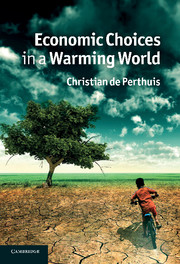Book contents
- Frontmatter
- Contents
- Acknowledgements
- Introduction
- 1 Climate risk
- 2 Some like it hot: adaptation to climate change
- 3 Building a low-carbon energy future
- 4 Pricing carbon: the economics of cap-and-trade
- 5 Intensifying agriculture to safeguard forests
- 6 The price of carbon: the economics of projects
- 7 Macroeconomic impacts: sharing carbon rent
- 8 International climate negotiations
- Conclusion
- References
- Appendix 1 Thirty key readings
- Appendix 2 Thirty key sets of figures
- Appendix 3 Greenhouse gas emissions around the world
- Glossary
- Index
2 - Some like it hot: adaptation to climate change
Published online by Cambridge University Press: 05 June 2012
- Frontmatter
- Contents
- Acknowledgements
- Introduction
- 1 Climate risk
- 2 Some like it hot: adaptation to climate change
- 3 Building a low-carbon energy future
- 4 Pricing carbon: the economics of cap-and-trade
- 5 Intensifying agriculture to safeguard forests
- 6 The price of carbon: the economics of projects
- 7 Macroeconomic impacts: sharing carbon rent
- 8 International climate negotiations
- Conclusion
- References
- Appendix 1 Thirty key readings
- Appendix 2 Thirty key sets of figures
- Appendix 3 Greenhouse gas emissions around the world
- Glossary
- Index
Summary
It was an Englishman, Arnold Lunn, to whom we owe the development of Alpine skiing. Founder of the Alpine Ski Club in 1908, Lunn organized the first skiing competitions in Switzerland and Austria. Through his efforts, the discipline was recognized by the International Ski Federation in 1930, then by the Olympic movement. Nearly 660 skiable areas are currently used in the Alps. But this environment is particularly sensitive to warming: the Alps is one of the parts of Europe where the temperature is rising fastest. A recurrent shortage of snow is already hampering the use of some sixty ski resorts. If the thermometer rises on average by 2°C in the coming decades, a hundred or so further resorts will face a lack of snow. If it goes up by 4°C, barely 200 resorts will still be able to operate. Resorts are spontaneously turning to making artificial snow. This type of adaptation increases energy use, which raises operating costs and emits greenhouse gases. It requires water – in France more than 10 million cubic metres each winter – which is expensive to transport. But there remains one essential ingredient for the snow cannons to function: cold. When the temperature refuses to fall, the cannons cannot be used and skiers have to head up to higher altitude resorts or convert to hiking. The unfortunate Mr Lunn would no doubt be turning in his grave.
In the West, the Maldives are primarily known for the images of atoll paradise promulgated by tour operators.
- Type
- Chapter
- Information
- Economic Choices in a Warming World , pp. 34 - 56Publisher: Cambridge University PressPrint publication year: 2011
- 1
- Cited by



